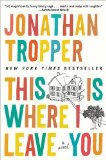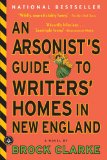Summary | Excerpt | Reviews | Beyond the book | Read-Alikes | Genres & Themes | Author Bio

Martin Dean feels "like a few misplaced molecules cobbled
together to form an implausible person." When asked to describe himself, he
comes up with "a seer of limited epiphanies" and "a megalomaniac and an
underachiever." He is Steve Toltz's growling philosopher king, ferociously
pessimistic yet irredeemably idealistic, his head a gaseous stew of misanthropy
and ridiculous ideas for societal transformation. The "long inglorious tumult in
his head" lands him in a mental hospital. It also spurs him to run for the
Senate and win on the promise to turn Australia into the "first truly
death-based society." Toltz can barely rein him in.
The story is supposed to be narrated by Martin's son, Jasper, but Martin keeps
breaking in. That pretty much sums up the tension that fuels the novel's mostly
breakneck pace through 530 pages. A Fraction of the Whole is Jasper's
attempt to come to terms with his father's influence. He is fated is to be
forever in the thrall of his barking mad father, just as Martin is himself fated
to be forever overshadowed by his famous brother, Terry, an Australian outlaw
hero in the tradition of Ned Kelly or Jesse James. It's tempting to say that
A Fraction of the Whole is a meditation on male identity formation and the
insufficiency of masculine role models in contemporary gender relations--but in
fact the novel is far weirder than that. Jasper discovers one of Martin's
notebooks, written at the time of his birth, and reads this eerie passage: "A
sickening idea has taken hold—this baby is me prematurely reincarnated. I
loathe this kid—I loathe it because it is me. It is me. It will surpass me. It
will overthrow me. It will know what I know, all my mistakes." Jasper submerges
this idea but it keeps bobbing back up, as when another character tells him that
he is more than an extension of his father: "It's him inside you, waiting to
come out." Jasper ends up realizing that "There's no way to sum him up. How
could I? If I was only a part of him, how could I possibly ever know who he
was a part of?" But the novel never stops trying to sum up its three motley
characters, manacled in antagonistic love.
The result is a ragged and loping tale, captivating even in its imperfections.
So what if characters are forever "groaning" or "screaming" or "shrieking" at
one another, never just "saying" or "replying." Toltz's overexuberant writing
style is worth it for his nonstop comedy and his unruly metaphors, such as a
singer's voice "like the feeling of bitter tinfoil" or a man who "had tasted the
collapse of his own mind, a taste that hadn't yet left his mouth." He plants
stories within stories, just because he can. My favorite is a toxic little
send-up of writing and publishing, featuring unknown authors who "emanated fear
and desperation and looked so hungry they would have signed away the rights to
their children for a lozenge, poor bastards."
Nonetheless, the novel could have used a good editing. Martin's story of his
life before Jasper's birth dominates the first third of the book, which gallops
forward with crackling energy. Then Jasper reclaims the story and it slows down
to a trot. The strong narrative arc peters out into loosely connected episodes.
A character is brought onstage solely so that he can die and jolt Jasper into
anguished self-awareness, yet the device fails because Toltz never gives his
readers a chance to empathize with the doomed boy. But if you pick up the book
and you like how it starts, stick with it. Toltz recaptures Martin's energy in
the last third of the book, and the story guns toward the conclusion of a really
good conspiracy that doesn't even start to terrorize the Deans until page 360,
right about where most novels would be wrapping things up.
I haven't even mentioned Martin's coma, The Handbook of Crime, a
mysterious Thai man who pops up in Paris and Sydney, or the labyrinth the Deans
construct to hide their home in the Australian bush. Clearly, Steve Toltz was
aiming to overtake Peter Carey and Richard Flanagan as Australia's most
inventive writer. He may have landed himself much farther.
![]() This review was originally published in The BookBrowse Review in March 2008, and has been updated for the
November 2008 edition.
Click here to go to this issue.
This review was originally published in The BookBrowse Review in March 2008, and has been updated for the
November 2008 edition.
Click here to go to this issue.

If you liked A Fraction of the Whole, try these:

by Jonathan Tropper
Published 2010
A riotously funny, emotionally raw novel about love, marriage, divorce, family, and the ties that bind—whether we like it or not.

An Arsonist's Guide to Writers' Homes in New England
by Brock Clarke
Published 2008
As a teenager, Sam Pulsifer's accidentally torches an American landmark, and killed two people in the blaze. After ten years in prison, he thinks he has put his past behind him - but when the homes of Robert Frost, Edith Wharton, Herman Melville, and Nathaniel Hawthorne, and even a replica of Henry David Thoreau's cabin at Walden Pond, go up in ...
Your guide toexceptional books
BookBrowse seeks out and recommends the best in contemporary fiction and nonfiction—books that not only engage and entertain but also deepen our understanding of ourselves and the world around us.